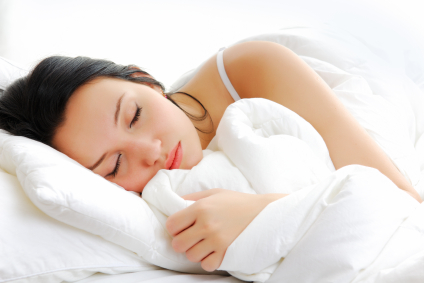Sleeping is not a choice… Your body needs it to work at its best.
But sleep doesn’t always come easy. The Centers for Disease control now classifies insufficient sleep as an epidemic.1
If you spend restless nights staring at the clock, then you know the feeling.
We’ve warned you before about the dangers of prescription sleep aids: headache, heartburn, and involuntary shaking.2 And then there are darker side effects… Users of Lunesta and Ambien report sleepwalking, sleep eating, even sleep driving.3
Why risk creating new problems for a few hours of rest?
The good news is that there are safe, natural alternatives to sleeping pills. Here are the five best natural sleep aids that you can get without a prescription…or the dangerous side effects.
- Melatonin: Okay, so you probably know this one. But you may not realize just how effective melatonin can be. The pineal gland produces melatonin in the absence of light. It regulates your natural sleep cycle, which helps you fall asleep and stay asleep.4 The most important thing to understand about melatonin is that it is a hormone. So be careful when supplementing with it. Too much can do more harm than good. Instead of artificial sources, get your melatonin naturally from foods like walnuts and this next one…
- Tart Cherries: These sour beauties not only taste great, they are an excellent, natural source of melatonin. Tart cherries contain more melatonin than any other food.5 They are loaded with antioxidants and fiber, so they make a great snack no matter how many “Z’s” you’re catching each night.
- L-Tryptophan: L-Tryptophan is an amino acid usually associated with turkey. It is key in serotonin production. Serotonin is a chemical that regulates mood and feelings of wellbeing. More serotonin means better relaxation, which means falling asleep faster and easier. Since L-Tryptophan is not produced naturally in the body, you have to get it from food. Some great sources include poultry (no surprise there), fish, eggs, and beef.6
- Valerian: Valerian is an herb that grows in Europe and Asia. It may not smell great, but people have been using it since the 2nd century to help them sleep. That says a lot about its effect.7 But don’t just trust the history books. Recent studies show the effectiveness of valerian as a sleep aid. One study shows that valerian root extract taken twice a day helps postmenopausal women have a more restful sleep.8
- 5-HTP: Its full name can be a real mouthful… But the idea behind 5-Hydroxytryptophan couldn’t be any simpler. 5-HTP is a chemical that the body can make after having L-Tryptophan. 5-HTP converts to serotonin, which may help you to fall asleep faster. But taking 5-HTP as a supplement is also shown to fight depression and the effects of fibromyalgia.9
These natural alternatives to potentially harmful and addictive sleeping pills are your best bet for a good night’s sleep. They are safe and easy to find.
Why put yourself at risk of facing the dangerous, bizarre side effects of a prescription sleep aid when you can get the best sleep of your life with a little help from Mother Nature?
Like this Article? Forward this article here or Share on Facebook.
References:
1 http://www.cdc.gov/features/dssleep/
2 http://www.webmd.com/sleep-disorders/guide/understanding-the-side-effects-of-sleeping-pills
3 http://www.nytimes.com/2007/03/15/business/15drug.ready.html?pagewanted=all&_r=0
4 http://www.webmd.com/sleep-disorders/tc/melatonin-overview
5 http://www.thehealersjournal.com/2013/04/08/foods-high-in-melatonin/
6 http://www.webmd.com/food-recipes/features/the-truth-about-tryptophan
7 http://ods.od.nih.gov/factsheets/Valerian-HealthProfessional/
8 http://www.ncbi.nlm.nih.gov/pubmed/21775910
9 http://umm.edu/health/medical/altmed/supplement/5hydroxytryptophan-5htp

